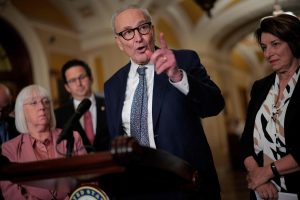White House Freezes $26 Billion for Democratic States as Shutdown Deepens
In Washington, the federal government shutdown opened with an immediate escalation Wednesday as President Donald Trump’s administration froze $26 billion in funding earmarked for Democratic-run states, heightening partisan tensions and sparking warnings of job losses and economic disruption.

The freeze halts nearly $18 billion in payments for major transit projects in New York, where Senate Majority Leader Chuck Schumer and House Minority Leader Hakeem Jeffries are the most senior Democrats in Congress. It also blocks almost $8 billion in green-energy investments across 16 Democratic states, including California and Illinois.
Administration officials cast the move as fiscal discipline. But Democrats blasted it as political retribution. Schumer accused Trump of “using the American people as pawns, threatening pain on the country as blackmail,” while Jeffries warned the freeze would derail thousands of construction and energy jobs tied to long-planned projects.
The standoff is already rippling through the workforce. At least 750,000 federal employees are being furloughed or working without pay, with Vice President JD Vance warning that layoffs could widen if the shutdown continues for more than a few days. Businesses that depend on federal contracts, from engineering firms in New York to renewable-energy startups in the Midwest, say they are bracing for sudden cash-flow gaps and potential layoffs.
Even some Republicans expressed unease. Senator Thom Tillis (R-N.C.) said freezing state funds risked worsening the stalemate. “They need to be really careful with that, because they can create a toxic environment here,” he cautioned.
Still, Republican leaders insist Democrats hold the key to reopening government. With the GOP holding a 53–47 Senate majority, Trump’s party cannot advance spending bills without at least seven Democratic votes to meet the chamber’s 60-vote threshold. Both sides remain dug in after failed negotiations, with Democrats demanding guarantees on health and infrastructure funding and Republicans pushing for leaner spending.
As Washington traded blame, the social costs mounted. Families of federal workers prepared for missed paychecks. Transit unions in New York warned that construction delays could sideline thousands of skilled workers. Green-energy groups said projects that were expected to bring long-term cost savings and climate benefits now risk abandonment.
The shutdown is the 15th since 1981, but the funding freeze marked an unusually direct strike on states aligned with the opposition. Whether it proves to be a bargaining tactic or a lasting cut, the fallout from the opening hours of this shutdown is already being felt far beyond the Beltway.








